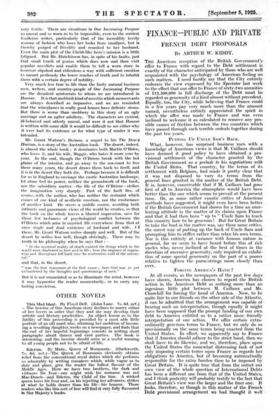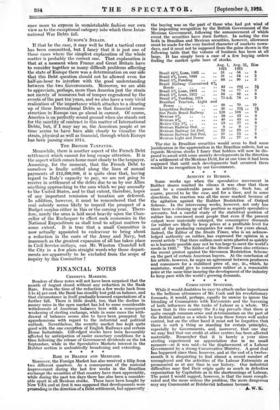• FINANCE - PUBLIC AND PRIVATE
FRENCH DEBT PROPOSALS
BY ARTHUR W. KIDDY.
THE American reception of the British Government's offer to France with regard to the Debt settlement is exactly of the character anticipated by those who are well acquainted with the psychology of American feeling on such matters. I need hardly say that the City entirely endorses the view expressed by the Spectator last week to the effect that our offer to France of sixty-two annuities of £12,500,000 in full discharge of the Debt must be regarded as generosity of a kind ahnost without precedent. Equally, too, the City, while believing that France could in a few years pay very much more than the amount named, nevertheless entirely appreciated the spirit in which the offer was made to France and was even inclined to welcome it as calculated to remove any pos- sible causes of friction between the two countries which have passed through such terrible ordeals together during the past ten years.
- PUTTING UP UNCLE SAM'S BACK.
What, however, has surprised business men with a knowledge of American views is that M. Caillaux should have deemed it good policy to have obtained a pro- visional settlement of the character granted by the British Government as a prelude to his negotiations with the United States. That country, by the terms of its settlement with Belgium, had made it pretty clear that it was not disposed to vary its terms from the general lines granted in the matter of the British Debt. It is, however, conceivable that if M. Caillaux had gone first of all to America the atmosphere would have been better than the one which seems to prevail at the present time. Or, as some rather caustic critics of American methods have suggested, it might even have been better if the British Government had shown for a time an unre- lenting attitude in the matter of its clainis upon France and that it had then been " up to " Uncle Sam to teach this country how to be generous ! But for Great Britain to take the lead in the matter was, say these same critics, the surest way of putting up the back of Uncle Sam and prompting him to stiffen rather than relax his own terms. Nor is this entirely at variance with human nature in general, for we seem to have heard before this of rich uncles who, never inclined at the best of times in the direction of ,excessive generosity, only required an exhibi- tion of some special generosity on the part of a poorer relative to tighten the purse-strings more closely than ever.
FORCING AMERICA'S HAND
At all events, as the newspapers of the past few days have shown, America has chosen to regard the British action in the American Debt as nothing more than an ingenious little plot between M. Caillaux and Mr. Churchill for forcing the hand of America. Now, to be quite fair to our friends on the other side of the Atlantic, it can be admitted that-the arrangement was capable of- bearing such an interpretation, though equally it might have been supposed that the prompt funding of our own debt to America entitled us to a rather, more friendly interpretation of our action. We offer certain extra- ordinarily generous terms to France, but we only do so provisionally on the same terms being exacted from the United States. In effect, we apparently say to France that if America should adhere to the strict bond, then we shall have to do likewise, and we, therefore, place upon the United States the somewhat distressing task of not only imposing certain terms upon France as regards her obligations to America, but of becoming -automatically responsible for the extra burden then to be imposed by Great Britain. It is quite true that from the outset our own view of the whole question of International Debts has been a different one from that of the United States, and I think posterity will probably testify' to the fact that Great Britain's view was the larger and the finer one. It k>oks, therefore, as though in this matter of the French Debt provisional arrangeinent we had thought it well once more to express in unmistakable ,fashion our own view as to the exceptional category into which these Inter- national War Debts fall. F ' EUROPE'S STRAIN.
If that be the case, it may well be that a tactical error has been committed, but I fancy that it is just one of those cases Where- the- simplest explanation of the whole matter is probably the correct one. That explanation is that at a moment when France. and Great Britain have to consider together so Many difficult problems affecting the state of Europe there was a determination on our side that this Debt question should not be allowed even for half-an-hour _to interfere with the good understanding between the , two Moreover, we are able to appreciate, perhaps, more than merica just the strain, not merely of resources' but of temper engendered by the events a the past ten years, and we also have a very vivid realization of "the importance which attaches to a clearing up of these International Debts so that financial recon- struction- iri--EuroPe can go ahead in earnest. Of course, America is on perfectly sound ground when she stands out for the sanctity Of contract in this matter of International Debts'; but, if I may say so, the American people at no time seems to -have been able clearly to visualize the strain,., physical as well as financial, through which Europe has been passing since 1914.
THE BRITISH TAXPAYER.
_ Meanwhile, there is another aspect of the French Debt settlement which cannot for long escape attention. It is the aspect which comes home most closely to the taxpayer. Assuming, for the moment, that the French Debt to ourselves is finally settled along the lines of annual payments of £12,500,000, it is quite clear that, having regard to Italy's capacity to pay, we are not going to receive in settlement of the -debts due-to-us by our Allies anything approaching to the sum Nihich we pay annually to the United States, and to that extent, therefore, hopes of any important remission of taxation are deferred. In addition, however, it must be remembered that the coal subsidy seems likely to imperil the prospect of a Budget surplus either in this or the coming year. There- fore, -surely the onus is laid most heavily upon the Chan- cellor of the Exchequer to effect such economies in the National Expenditure as shall tend to adjust matters to some extent. It is true that a small Committee is now actually appointed to endeavour to bring about i a reduction in the costs of the Army .and Navy, but inasmuch as the greatest expansion of all has taken place in Civil Service-outlays, can Mr. Winston Churchill tell the City in a few plain straight words why those depart- ments are apparently to be excluded from the scope of inquiry by this Committee ?











































 Previous page
Previous page